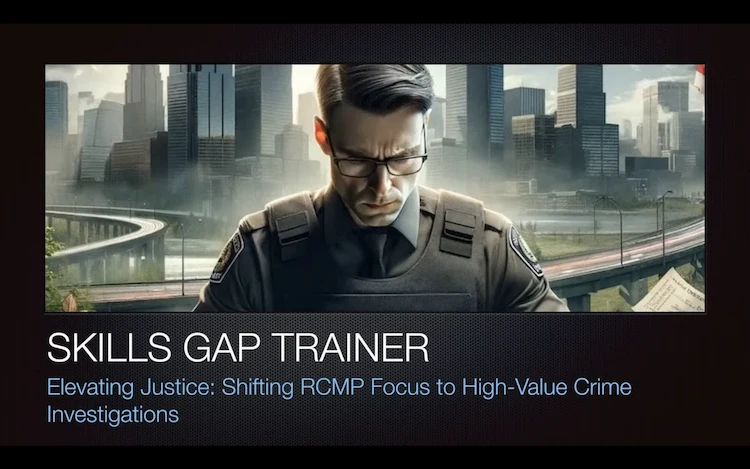Video Title: Elevating Justice – Shifting RCMP Focus to High-Value Crime Investigations

Link: https://youtu.be/LoFtcFuGMJQ?si=F0tGOKvT2tinG1x2
At Skills Gap Trainer, our Director of Video has a distinct penchant for police video shows, particularly those from the USA. These shows often depict highly trained, proficient detectives and high-ranking police officers delving deep into minor infractions. One commonly showcased scenario involves the meticulous investigation of minor thefts, such as a $50 construction tool stolen by a homeless individual from a site. These officers, possessing a remarkable blend of boldness akin to Will Smith, keen observational skills, unwavering confidence, and legal prowess, are showcased as unerring agents of justice. Yet, there’s an evident gap in the narrative. While these professional officers are quick to probe into small-scale offences, they are conspicuously absent from the heart of the financial districts during significant banking crises. There’s no depiction of these highly capable officers questioning potential mismanagement or excessive speculation with client funds in major banks. The stark difference in how the law is portrayed – focusing intensely on the underprivileged for minor discrepancies while seemingly turning a blind eye to potential white-collar crimes involving astronomical sums – is both intriguing and unsettling. This selective portrayal raises questions about transparency and equity in law enforcement. While e-transfers as small as $25 are scrutinized, whether by Interac, bank CSRs, tax authorities or even police, the same vigilance doesn’t seem to extend to high-profile financial establishments potentially involved in questionable activities. It’s our aspiration that Canada cultivates an RCMP culture that champions transparency across all societal strata. It’s essential to ensure that investigations aren’t limited to the theft of a mere $50 but extend to potential malpractices involving millions or even billions. Every echelon of society, irrespective of stature or affluence, should be accountable. We ardently hope that the broader public supports the idea that white-collar crimes deserve as much attention, if not more, as minor thefts. The quest for justice should be universal, leaving no stone un-turned.
Skills Gap Trainer comment:
Time for Wisdom, Canada! Our nation’s strength is drawn from the tireless labour of our working class, the bedrock of our society. Yet, we observe our scales of justice faltering, fixated on the small-scale missteps of individuals (local construction site or house) while pervasive systemic and environment issues (cities), and higher level issues (in tall buildings), fostered by those wielding power, stand tall and remarkably unaddressed. The moment is now to expand our focus, to summon the RCMP to broaden their vigilance and amplify their scope beyond the trivial offences (handing traffic tickets, etc..) to the deeply ingrained realms of corruption among the higher classes and higher levels of society, to the crimes tallying up to six, seven, eight, and even nine figures.
We must delve into the murky waters of speculative banking, dissect the scientifically unsound and technically unsound HR competency evaluations, hiring within your own age group hiring HR practice, the chaotic and unstructured decision-making interview processes within the public HR departments, or even private start-up tech businesses with low organizational maturity levels in HR, spotlight the land zoning custodians siding with homeowners or landowners against the next generation (Millenials and Gen Z), and interrogate the worrisome trend of “non free-market aligned, transparent overcompensation” within our public and banking sectors. Mere transparency in disclosing hefty salaries to the public domain, funded by public taxes, does not mean the action to overcompensate above private market price of a public agent was not corruption. Or the sins of banks leveraging “government-provided credit creation license, debt/money creation facilities” (money printer) to inflate the currency of the nation to a level that the working class outside of banks cannot afford to survive, but due to the profitability the banks attain from their government provided money creation license, the banks are able to overcompensate their own workers to keep up with and defeat inflation, while the cost of the inflation the banks created is passed on to every other business which does not have a similar “built in”, “state provided”, “money printing facility license”. These “non-free market aligned overcompensation wage levels”, do not adhere to the rules of the free market, it’s not a market between equal agents, and as such, the banks or government is not cleansed of sin, merely because they’ve written the overcompensation action done in daylight and on the public record, “pretending transparency is legitimacy”. The banks may claim they can set whatever price they want for their wages, but this omits the fact that they are not private agents in the market as long as they using a special permitting process outside the regular free market rule-set for all other organizations, therefore acting as a branch of the government.
Moreover, we cannot overlook the government’s unique position, which affords them the ability to create inflationary pressures through their budget process, yet this process affords them the unique ability to shield their employees from the resulting economic squeeze and the rising inflation levels and rising interest levels. This duality allows them to inflate away debt and devalue public currency while insulating their workforce with “tax-funded salaries or “inflation-funded salaries” that can be adjusted in real-time to any inflation level required, a type of “non-free market level overcompensation level that is not commeasurate or aligned with private market wage rates”. During times of moderate to severe inflation, this “built in government level money creation mechanism” sets their employees apart from all other employees in the free market, the government worker wages are floated upward as needed with the inflation they helped manifest, leaving the private sector to grapple with the aftermath and resultant economic damage — private market wages remain stagnant against the rising tide of living costs. If both the government and the banking sector, were to have their ability to create money removed, their profitability would not be so high, and so they would not be able to pay their employees more than other employees in the economy that does not have access to this special money creation privilege, and inflation would reduced by the stressed out banking and government workers, when real life economic forces force their hand to act responsibly to the inflation mechanism in the country. Then the banking system and the government would cease to create inflation in the economy the moment that their special privilege of “wage inflation protection” is removed from bank or government workers.
This systemic imbalance, designed at the core of government and banking, underscores the need for our law enforcement to pivot their gaze upwards, to scrutinize the high-value crimes that silently eat away at the core of our society. It’s about holding the big income and asset players to account, ensuring that we don’t squander the finite and precious resources of the RCMP on the small fry when they could be unearthing the real power brokers, the decision-makers, the ones orchestrating these vast economic levers. Together, we must champion this crucial shift in focus, propelling their scrutiny to a new reality, ensuring that justice in Canada is as comprehensive and penetrating as it is equitable, leaving no stone un-turned, from the grassroots, but far more importantly, to the soaring towers.
In the march towards oversight, our collective voice must rise to advocate for transparency that leads to accountability for those that squander the most amount of resources — for an economic system that provides “an inflationary protective shield to some”, while simultaneously promoting RCMP investigation to those without this “great inflationary shield”. It is time to wise up Canada – Let’s unite to demand a re-calibration of justice, ensuring it is not to status or wealth, to those with control of money creation, to those in charge of the inflation distribution for various working groups of society, to the corridors of power where the true architects of inflation distribution across an economy reside, where the true architects of our economic environment reside. s them to inflate away debt and devalue public currency while insulating their workforce with “tax-funded salaries or “inflation-funded salaries” that can be adjusted in real-time, to an “non-free market level overcompensation level that is not commeasurate or aligned with private market rates”. During times of moderate to severe inflation, this ‘built in government level money creation mechanism” sets their employees apart, their wages floating upward with the inflation they helped manifest, leaving the private sector to grapple with the aftermath — wages stagnant against the rising tide of living costs. If both the government and the banking sector, were to have their ability to create money removed, their profitability would not be so high, and so they would not be able to pay their employees more than other employees in the economy that does not have access to this special money creation privilege, and inflation would reduced by the stressed out banking and government workers. Then the banking system and the government would cease to create inflation in the economy the moment that their inflation protection money creation privilege was removed.
To conclude, please remember that the Liberal MP leadership spent the last three years to push the RCMP to take the property of sports shooters, hunters, and vetted firearms owners. Instead of leading the country to new heights, and elevating the RCMP to discover the inefficiencies and the high level crime, they lowered the RCMP to keep a tight leash on the most responsible and safe citizens of Canada by statistics. Think about this article when you think about Bill C-21. Think about this article and whether you do really like the government and RCMP to pass laws by Order in Council or whether they should do it the old fashion style with the legislative process. Think about elevating the RCMP, and maybe we will all achieve real public safety. And don’t forget, the very reason firearms were invented, is because humanity has always been plagued by people who enjoy passing laws with Executive Orders, Mandates, Dictates and Orders in Council (May 2020 OIC, etc). Don’t forget. Keep safe.
Related books and resources:
“The Economics of Public Trust: The Compromise of Canada’s Economic Future“ by Thomas J. Courchene and Donald J. Savoie. This book may provide insights into how economic policies and law enforcement practices influence public trust and economic stability in Canada.
“Trust and Public Policy: How Better Governance Can Help Rebuild Public Trust“ by the OECD. This publication could offer an international perspective on the relationship between governance, law enforcement, and public trust, with actionable insights that may apply to the Canadian context.
“Policing the Banks: Accountability Mechanisms for the Financial Sector” by Mathieu Deflem. This book explores the complexities of policing financial institutions, which could complement the discussion on shifting RCMP focus towards high-value crime investigations.
“Corruption, Integrity and Law Enforcement“ by Cyrille Fijnaut and Letizia Paoli. This comprehensive exploration of corruption and law enforcement could provide a foundational understanding of systemic issues within various institutions, including those in Canada.
“Financial Crime and Crises in the Era of False Profits” by Robert H. Tillman, Michael L. Indergaard, and Sharyn L. Roach Anleu. This work delves into financial crimes and their impacts, which could offer relevant background for advocating RCMP investigations into high-value crimes.
“Canadian Criminal Justice Policy: Contemporary Perspectives” by John Winterdyk and Michael Weinrath. This collection of essays on Canadian criminal justice policy might provide a broader context for discussions about law enforcement practices and priorities.
“The Limits of Trust: The Millennium Development Goals, Maternal Health, and Health Policy in Mexico” by Lígia de Salazar. While focusing on Mexico, this book discusses the limits of trust in government and public services, offering comparative insights that could be relevant to the Canadian situation.
“Policing Financial Crime: Intelligence Strategy Implementation” by Petter Gottschalk. This book specifically addresses the strategic implementation of intelligence in policing financial crime, which could be directly relevant to discussions about refocusing RCMP efforts.
To see our YouTube Channel, click https://www.youtube.com/@skillsgaptrainer


.